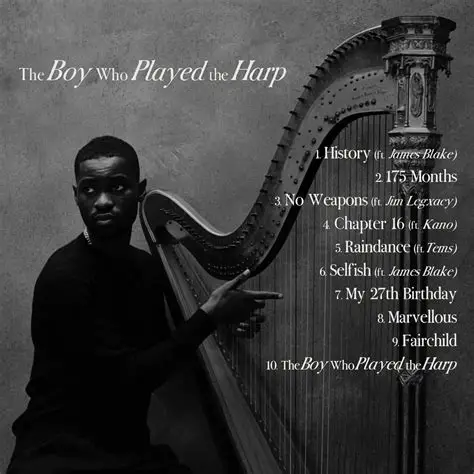British Rapper, David Orobosa Omeregie popularly known as Dave or Santan Dave known for his lyrical delivery and wordplay released his third solo album The Boy Who Played The Harp on October 24, 2025.
This album is a piece of personal evolution and growth and every track on this album carries a spiritual tone. This is not just a musical release; it is an invitation to share Dave’s journey as he connects his story with his listeners.

Dave’s album release triggered a profound moment, dominating digital spaces and online discourse. The impact of the record was evidenced by it’s viral speed across all social media platforms with the album’s lyric transforming into conversation points. This digital frequency confirms Dave’s status as a significant cultural force capable of capturing the collective attention of the internet upon release.
The choice of title, The Boy Who Played The Harp, is arguably one of the most profound highlights of the album. I think he chose this title to draw an explicit parallel between himself and the biblical King David. In the Old Testament, the young David was known not only for defeating Goliath but also for being a skillful harp player whose music could soothe King Saul when he was troubled. Dave makes reference to this in his opening track History to align his own mission: using his narrative driven music and storytelling skills to bring clarity, calm and guidance to his listeners far and wide.
The first track on the album History functions as a commanding opener initially showcasing the familiar flair of Rap Braggadocio before pivoting into a self-reflective narrative that lays the foundation for the album. The initial verses assert Dave’s success and stance in the music world. He declares himself as a legend and brags about his wealth and possession; “A garden the same size as Adam and Eves, I got trees, a forest you better believe”. He attributes his success to God’s plan, emphasizing that it’s undeniable and divinely ordained. The track’s message is Destiny and History and the question of Legacy ties it to the album’s title. Dave is aware that every step he takes becomes part of his personal history and the pressure is on to ensure that this history is meaningful.

The second track which happens to be my favorite track on the album 175 Months serves as raw spiritual, deeply introspective confession. In this track, he is vulnerable and he delivers his verses in an almost conversational manner. It feels like you’re hearing a private dialogue with God. He begins with Humility and talks about the distance he feels from his faith and God. He reminisces on the loss of his Friend Abdullah who remains frozen at 14 while others age. The most impactful line is a self-interrogation “How am i trying to pray for Congo with these diamonds on my neck?” This line acknowledges that wealth stands in opposition to empathy and global awareness. This lyric confronts Hypocrisy. The refrain I’m just praying that my purpose justifies my pain, shifts the focus from wealth to meaning. A plea that all the suffering and pain experienced in life ultimately leads to a meaningful outcome.
In this track, Dave reveals a burden of guilt that weighs on his conscience despite the grace shown to him. The metaphor of material blessings leading to spiritual drift; I prayed for new shoes and i used them to walk away from you symbolizes how the very success and comfort he prayed for became the very tool of his separation from his religious foundation.

The album progresses with the third track Weapons which powerfully shifts the tone of the album. The chorus of this track was drawn from the Bible, specifically Isaiah 54 v 17, which states “No weapon fashioned against thee shall prosper and every tongue that shall rise against thee in judgment thou shall condemn.”
Dave and Jim Legacy rephrase this biblical promise in the chorus, turning it into a resolute mantra. This spiritual shield is not just a statement of faith but an assertion of a protected destiny. Dave’s verse explores his journey and an admission of the personal and moral conflivts that come with fame and success. This internal struggle is resolved with a redirection to his purpose and God’s word; “Let me face my Bible and sing my songs.” This line equates his musical artistry with his spiritual discipline positioning his talent not as a source of vanity but a tool for making an influence. He concludes with the aspiration, “I just want to build something and say i gave to my kids” grounding his entire pursuit in generational stability.
The fourth track on the album Chapter 16 stands as one of the most narrative pieces. The song is dedicated to a mentor figure widely believed to be a Rap legend Kano, a man Dave studied intensely, recalling “Had me on your team, i studied you since i was fourteen.” Chapter 16 is a Dialogue between Dave and Kano; a conversation about Legacy, morality and the price of the crown. Kano’s response is a masterful demonstration of what a true mentor offers structured as a series of essential life lessons. Chapter 16 is best described as one of the most Inter-generational exchanges ever committed to record.
Let’s talk about Raindance featuring the effortlessly soulful Tems. It’s a whole movie in a track. This song tells the story of how a tough first date can actually become a promise for a shared future. When he calls her “Wild Child, Beautiful Child”, it’s not just a compliment, its his way of celebrating her individuality. It’s the ultimate progression; From a gift, to a home, to a lifetime partner. The collaboration with Tems is pure magic and there couldn’t have been anyone better for the track.
Every track on the album is an intentional chapter of Dave’s artistic narrative. The album is engineered with a sense of purpose ensuring that every song carries a distinct message. It demands a start to finish listen with no skips.
Fairchild ft Nicole Blakk centers on male entitlement, misogyny and femicide. The track highlights how women are forced to normalize everyday threats. Topics like sexual assault, systematic failure and the transactional nature of men who demand a reward for their protection. Fairchild is the uncomfortable truth that needs to be heard.
You think you’ve heard it all but then there’s My 27th Birthday, the pinnacle you didn’t think the album could reach. This track is a confession and a scrutiny to Dave’s life. He turns 27 and summarizes his journey in minutes, driven by artistic sincerity as he confronts his struggles. He is overwhelmed by all the contradictions he has to hold at once. He calls himself the Hero and the Villain in his own story and that duality is the theme of the song. This track is Therapeutic and one line that sticks the most is the ultimate Self Diagnosis “How do i explain that i don’t want to heal cause my identity is pain?”
Selfish featuring James Blake is a radical interrogation built on a rapid sequence of rhetorical questions. It reveals a raw vulnerability behind Dave’s persona. This track is a pivotal piece within Dave’s discography and perfectly captures the emotional isolation despite the success and achievements. This is not self-doubt, it is self-indictment. He internalizes every possible fear, Relationship breakdowns, personal instability and emotional distance. Selfish is deeply connected to 27th birthday as they both explore a burden of being a conscious, wealthy and public figure.
Marvellous is a reflection and exploration of the blurred lines between personal success and social responsibility. While selfish deals with the fear of being broken, Marvellous deals with the certainty of having broken another person. The track reminds us that success is often paid for by the destruction of those left behind.
The last track on the album which happens to be the foundation for the entire project is arguably the most significant track on the album. The boy who played the harp is the spiritual anchor of the album. It is purpose, success and an articulation of what it means to be a voice with a global audience. This song is the true meaning of the biblical name, David.
The Boy Who Played the Harp is more than just an album, it is a mirror reflecting the complexities in the world today. Every song feels personal yet relatable, evidence of how much work and truth was poured into this piece. This is an essential listen for anyone who seeks music with a heart. Santan Dave poured his heart into this project, and it feels like a privilege to experience an artist so willing to bare his soul with such grace and brilliance.
